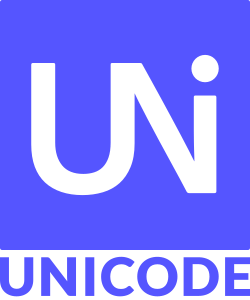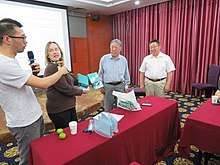Unicode Consortium
The Unicode Consortium (Unicode Inc.) is a 501(c)(3) non-profit organization based in Mountain View, California.[3] Its primary purpose is to maintain and publish the Unicode Standard which was developed with the intention of replacing existing character encoding schemes which are limited in size and scope, and are incompatible with multilingual environments.
 | |
| Formation | January 3, 1991 |
|---|---|
| Founder | |
| Founded at | California, United States |
| Type | Non-profit consortium |
| 77-0269756[1] | |
| Legal status | 501(c)(3)[1] |
| Purpose | To develop, extend and promote use of various standards, data, and open source software libraries which specify the representation of text in modern software, allowing data to be shared across multiple platforms, languages and countries without corruption or need for re-engineering.[2] |
| Location | |
| Coordinates | 37.411759°N 122.070958°W |
Key people |
|
Revenue (2018) | $467,576[2] |
| Expenses (2018) | $470,257[2] |
Employees (2018) | 3[2] |
Volunteers (2018) | 10[2] |
| Website | home |
The Consortium describes[4] its overall purpose as "This Corporation’s specific purpose shall be to enable people around the world to use computers in any language, by providing freely available specifications and data to form the foundation for software internationalization in all major operating systems, search engines, applications, and the World Wide Web. An essential part of this purpose is to standardize, maintain, educate and engage academic and scientific communities, and the general public about, make publicly available, promote, and disseminate to the public a standard character encoding that provides for an allocation for more than a million characters."
Unicode's success at unifying character sets has led to its widespread adoption in the internationalization and localization of software.[5] The standard has been implemented in many recent technologies, including XML, the Java programming language, Swift, and modern operating systems.[6]
Voting members include computer software and hardware companies with an interest in text-processing standards,[7] including Adobe, Apple Inc., Berkeley, Emojipedia, Facebook, Google, Huawei, IBM, Microsoft, Monotype, Oracle Corporation, Yahoo! and SAP SE.[8][9][10] Technical decisions relating to the Unicode Standard are made by the Unicode Technical Committee (UTC).[11]
Founding
The project to develop a universal character encoding scheme called Unicode was initiated in 1987 by Joe Becker, Lee Collins, and Mark Davis.[12][13] The Unicode Consortium was incorporated in California on January 3, 1991,[14] with the stated aim to develop, extend, and promote the use of the Unicode Standard.[15] Mark Davis has been president of the Unicode Consortium since the consortium was incorporated in 1991.[16]
Work
Our goal is to make sure that all of the text on computers for every language in the world is represented but we get a lot more attention for emojis than for the fact that you can type Chinese on your phone and have it work with another phone.
— Unicode Consortium co-founder and president Mark Davis[17]

The Unicode Consortium cooperates with many standards development organizations, including ISO/IEC JTC 1/SC 2 and W3C. Apart from The Unicode Standard (TUS) and its annexes (UAX), the Unicode Consortium also maintains the CLDR, collaborated with the IETF on IDNA, and published related standards (UTS), reports (UTR), and utilities.[18][19]
The group selects the emoji icons used by the world's smartphones, based on submissions from individuals and organizations who present their case with evidence for why each one is essential.[17]
Publications
The Unicode Consortium maintains a History of Unicode Release and Publication Dates.
Publications include
- The Unicode Standard, Version 12.0. Web publication. March 2019. ISBN 978-1-936213-22-1.
- The Unicode Standard, Version 5.0 (5th ed.). Addison-Wesley. October 2006. ISBN 978-0-321-48091-0.
- The Unicode Standard, Version 4.0. Addison-Wesley. August 2003. ISBN 978-0-321-18578-5.
See also
- Comparison of Unicode encodings
- Universal Character Set
- Universal Character Set characters
References
- "Unicode Consortium". Tax Exempt Organization Search. Internal Revenue Service. Retrieved February 5, 2020.
- "Form 990: Return of Organization Exempt from Tax". Unicode, Inc. Internal Revenue Service. December 31, 2018.
- Wong, Queenie (February 12, 2016). "Q&A: Mark Davis, president of the Unicode Consortium, on the rise of emojis". The Mercury News. Retrieved April 5, 2018.
- "The Unicode Consortium Bylaws" (PDF). November 6, 2015. Retrieved 6 December 2019.
- "How will you type the new Rupee symbol?". IBNLive. July 15, 2010. Archived from the original on July 18, 2010.
- "Strings and Characters". The Swift Programming Language (Swift 4.1). Apple. Retrieved April 25, 2018.
- Sugar, Rachel. "Tacos, dumplings, bagels: the complicated politics of food emoji". Vox. Retrieved October 27, 2018.
- "The Unicode Consortium Members". Unicode, Inc. Retrieved March 16, 2010.
- Unicode, Inc. (September 15, 2015). "Facebook Joins as Full Member of the Unicode Consortium". The Unicode Blog. Retrieved August 25, 2017.
- Pelletiere, Nicole (October 25, 2018). "Emoji contenders for 2019 include mixed-race couples, a sloth and wheelchairs". ABC News. Retrieved October 27, 2018.
- McGowan, R. "A Summary of Unicode Consortium Procedures, Policies, Stability, and Public Access". tools.ietf.org. Retrieved April 5, 2018.
- "History of Unicode : Summary Narrative". Unicode Consortium. Retrieved April 25, 2018.
- Yau, John (July 17, 2016). "Better Days". Hyperallergic. Retrieved November 29, 2018.
- Roy, Jessica. "Apple is replacing the pistol emoji with a squirt gun". latimes.com. Retrieved November 29, 2018.
- "Unicode History Corner". Unicode, Inc. Retrieved August 25, 2017.
- "Unicode Directors, Officers and Staff". Unicode Consortium. Retrieved April 25, 2018.
- NPR Staff (October 25, 2015). "Who Decides Which Emojis Get The Thumbs Up?". NPR. Retrieved February 10, 2019.
- "Unicode Technical Reports". Unicode, Inc.
- "Unicode Utilities: Internationalized Domain Names (IDN)". Unicode, Inc.
External links
| Wikibooks has a book on the topic of: Unicode/Character_reference |